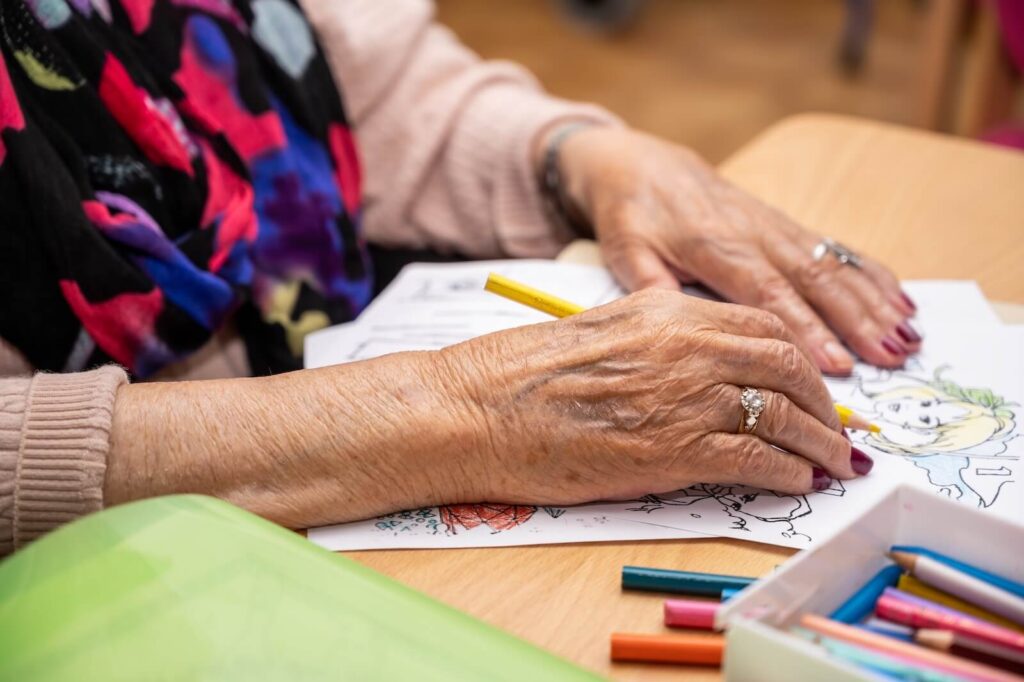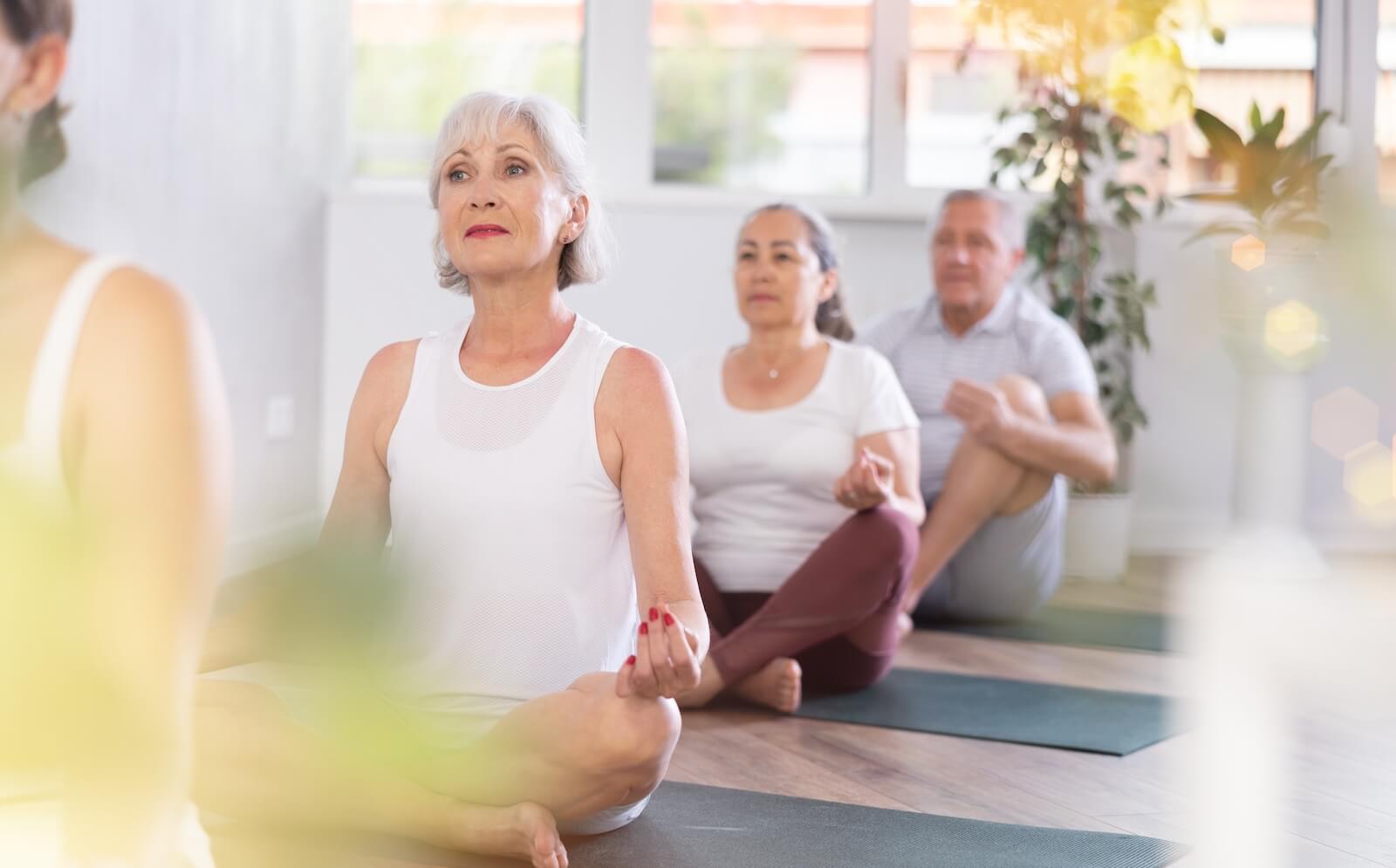Aging gracefully isn’t just about maintaining physical health—it’s also about fostering mental and emotional wellness. For seniors, meditation and mindfulness can be effective at promoting overall well-being. These practices can help with managing stress, depression, and anxiety. They can also promote physical wellness and support pain management.
Whether you or your loved one is interested in assisted living, respite care, or another lifestyle, meditation and mindfulness classes may be activities offered by your senior living community.
What is Mindfulness & Meditation?
Mindfulness and meditation are techniques that have been used by human societies for thousands of years. Though they are often associated with spiritual traditions, you don’t have to be religious to reap their benefits.
Mindfulness
According to the American Psychological Association (APA), mindfulness is awareness of the present moment. When you’re mindful, you’re aware of your internal state and what’s around you, but you’re not judgemental of thoughts, emotions, or surroundings. This practice encourages observing thoughts and emotions without reacting to them impulsively.
Mindfulness is used in interventions such as mindfulness-based cognitive behavior therapy (MCBT) and mindfulness-based stress reduction (MBSR).
Meditation
Meditation can involve techniques like deep breathing, mantra repetition, or visualization. Through these techniques, practitioners can focus, relax, and reduce stress. While often rooted in spiritual traditions, meditation is now widely recognized for its mental and physical health benefits.
Mindfulness and meditation are related concepts. You can think of mindfulness as a meditation technique that helps reduce stress and promote calm.
Benefits of Meditation & Mindfulness
Today, meditation and mindfulness are popular practices among people of all ages, and these techniques can benefit older adults in particular.
Tool Against Stress
Aging often brings unique stressors, whether it’s adjusting to retirement, dealing with health concerns, or navigating life changes. The National Council on Aging suggests meditation techniques such as deep breathing and positive visualization to counteract stress symptoms like racing thoughts and tension.
Furthermore, a 2016 study of seniors experiencing stress showed that self-rated measures of mental health improved after practicing mindfulness (though cognitive function and physiological measures didn’t).
Helpful for Depression
Older adults may face life circumstances that put them at risk for depression, but mindfulness can be a potent tool against anxiety and depression. By learning how to stay grounded and de-centered from negative thoughts, seniors can use mindfulness as a potentially effective treatment against depression.
In fact, 2021 meta-analysis found significant reductions in depression symptoms among seniors who underwent mindfulness meditation interventions.
May Boost Cognition
Mindfulness may strengthen the mind as much as soothe it. Research suggests it can help with mental clarity and flexibility. After all, mindfulness trains mental attention, focus, and flexibility.
One 2021 study found that training older adults in mindfulness led them to perform better on a cognitive functioning test. This finding was also associated with stronger connectivity within the brain’s default mode network, which is sensitive to aging effects.
Supports Physical Health
Beyond mental health, mindfulness extends its benefits to physical well-being. Research links mindfulness to improvements in lower back pain, rheumatoid arthritis, psoriasis, Type 2 diabetes, and fibromyalgia. One study found that, for older adults with mild cognitive impairment, participation in a Mindful Awareness Practice (MAP) was linked to improved inflammatory biomarkers.
Mindfulness & Pain Management
Chronic pain is a common experience among older adults. However, mindfulness is associated with improvements in pain management. In one study, older adults with lower back pain experienced improved function and reported reduced pain (at least temporarily) after undergoing a mind-body program based on the principles of mindfulness.
Meditation & Mindfulness: What You Should Know

Inner work like mindfulness and meditation can trigger a negative response in some people, especially those who have experienced post-traumatic stress disorder (PTSD) or complex PTSD. Sometimes, this can happen to the point of requiring additional treatment.
It’s a good idea to have coping tools ready should you experience discomfort or distress. Consulting with a mental health professional like a trauma-informed therapist may be a good idea if you’re concerned that mindfulness may lead to distress.
Mindfulness Activities
Mindfulness isn’t just about sitting still. There are numerous ways to practice mindfulness, such as:
- Mindful eating: Paying attention to the experience of eating can aid in digestion and boost enjoyment of food.
- Walking meditation: This practice involves focusing on the physical experience of walking. Studies have shown that it’s associated with more positive emotion.
- Mindful coloring: Adult coloring books have become very popular in recent years. Coloring can be a fun activity on its own, and doing it mindfully may lead to mental health benefits too.
Mindfulness Activities at Senior Living Communities
One benefit of living in a senior community is the ability to access a wide variety of physical, emotional, and spiritual programs. For example, All American Assisted Living at Tinton Falls offers relevant events like Beginner’s Yoga and Guided Meditation. If you’re interested in a senior community that centers on compassion, integrity, respect, we invite you to contact us and schedule a tour. See you soon!





